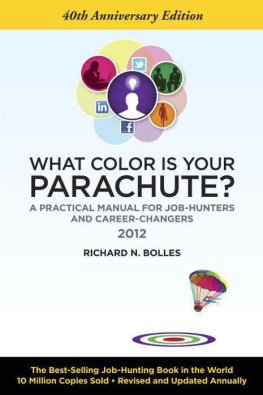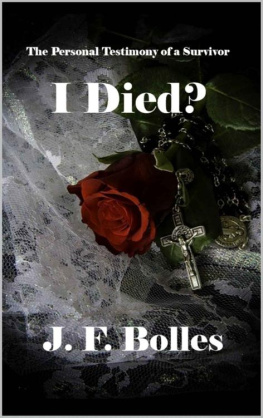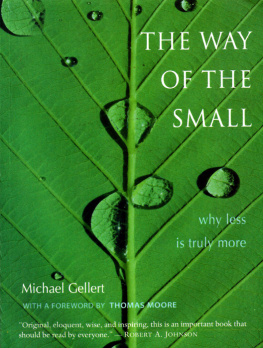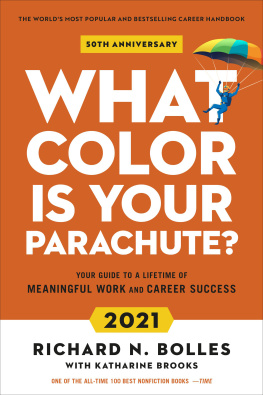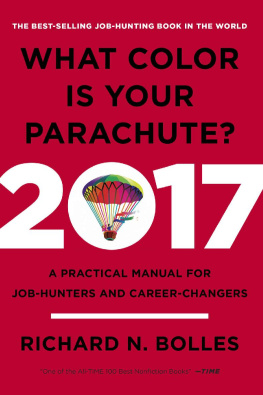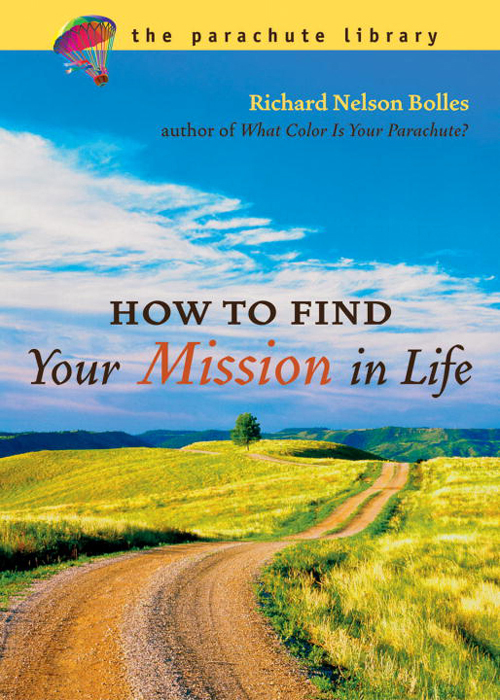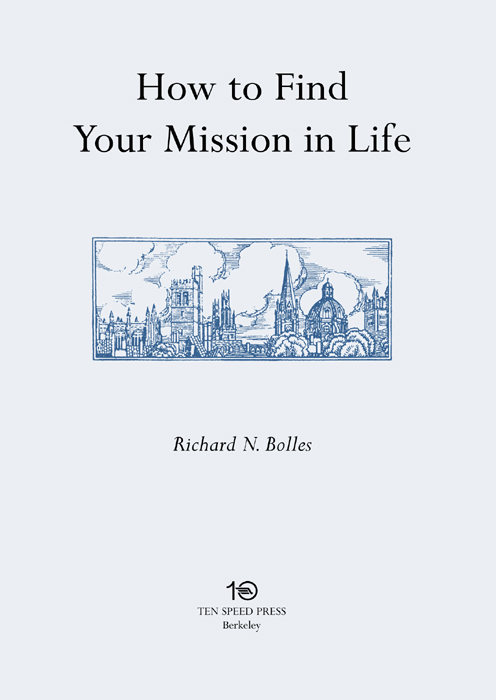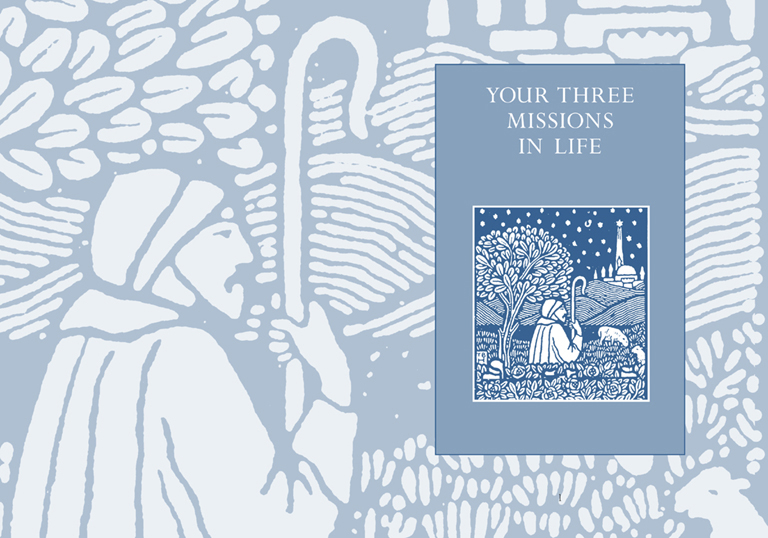BOOKS BY
R ICHARD N. B OLLES :
What Color Is Your Parachute?
The Three Boxes of Life
Where Do I Go From Here With My Life?
Job-Hunting on the Internet
What Color Is Your Parachute Workbook
Career Counselors Handbook
Job-Hunting for the So-Called Handicapped
Copyright 1991, 2000, 2005 by Richard Nelson Bolles.
Front cover photograph: Ryan/Beyer/Getty Images
All rights reserved. Published in the United States by Ten Speed Press, an imprint of the Crown Publishing Group, a division of Random House, Inc., New York.
www.crownpublishing.com
www.tenspeed.com
Ten Speed Press and the Ten Speed Press colophon are registered trademarks of Random House, Inc.
A different version of this material has previously appeared in What Color Is Your Parachute?, copyright 1970, 1972, 1975, 1976, 1977, 1979, 1980, 1981, 1982, 1983, 1984, 1985, 1986, 1988, 1989, 1990, 1991, 1992, 1993, 1994, 1995, 1996, 1997, 1998, 1999, 2000, 2001, 2002, 2003, 2004, 2005, 2006, 2007, 2008, 2009 by Richard Nelson Bolles, also published by Ten Speed Press.
Library of Congress Cataloging-in-Publication Data is on file with publisher.
eISBN: 978-1-60774-356-9
Cover design by Betsy Stromberg
v3.1
Dedicated to
Sister Esther Mary,
of the Community of the Transfiguration,
Glendale, Ohio, my aunt, Godmother
and mentor, with love.
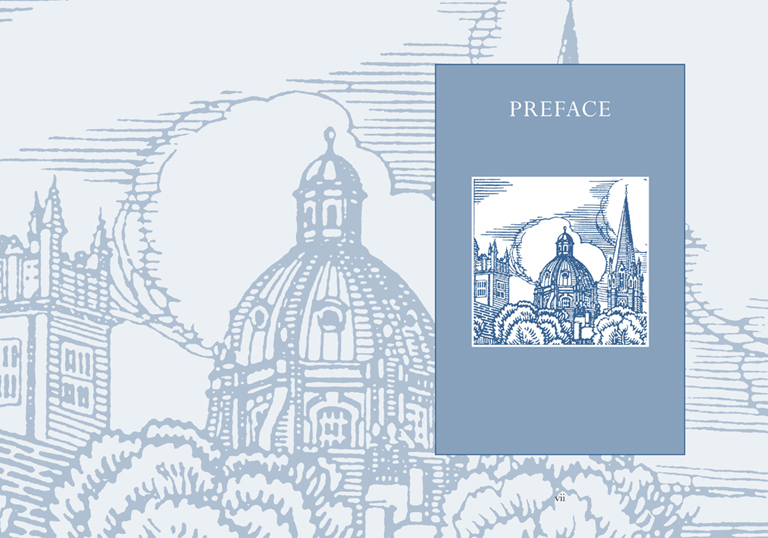

Preface
S ome time ago, a woman asked me how you go about finding out what your Mission in life is. She assumed I would know what she was talking about, because of a diagram which appears in one of my books -- The Three Boxes of Life; it looks like this:
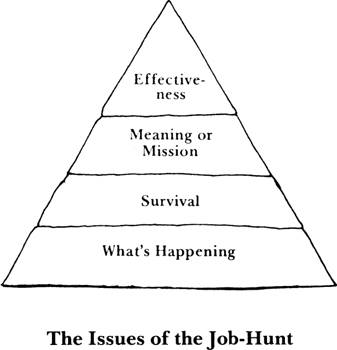
As this diagram asserts, the question of ones Mission in life arises naturally as a part of many peoples job-hunt, once one has passed the lower levels of figuring out whats happening, and learning to survive.
She told me that what she was looking for was not some careful, dispassionate, philosophical answer, where every statement is hedged about with cautions and caveats -- It may be or It seems to me Nor did she want to know why I thought what I did, or how I learned it, or what Scriptures support it. I want you to just speak with passion and conviction, she said, out of what you most truly feel and believe. For it is some vision that I want. I am hungry for a vision of what I can be. So, just speak to me of what you most truly feel and believe about our mission in life. I will know how to translate your vision into my own thought forms for my own life, when I reflect afterwards upon what you have said. But I want you to talk about this now with passion and conviction -- please.
And so, I did. And I want to set down for you, here, essentially what I said to her.
I should say, before I start, that I do not personally believe it is possible to discuss Mission without getting into the subject of religion. Some will rejoice at this; others will be put off by it. Because I must mention religion here, I toyed at first with the idea of following what might be described as an all-paths approach to religion. But, after much thought, I decided not to try that. This, because I have read many other writers who tried, and I felt the approach failed miserably. An all-paths approach to religion ends up being a no-paths approach, even as a woman or man who tries to please everyone ends up pleasing no one. It is the old story of the universal us vs. the particular.
Let me illustrate. I am best known for my books on career counseling, such asWhat Color Is Your Parachute?Those of us who do career counseling know well that trying to stay universal is not likely to be helpful, in writing about anything. We know well that truly helpful career counseling depends upon defining theparticularityor uniqueness of each person we try to help. No employer wants to know only what you have in common with everyone else. He or she wants to know what makes you unique and individual. As I argue throughout each annual edition ofParachute, the identification and inventory of your uniqueness or particularity is crucial if you are ever to find meaningful work.
This particularity invades and carries over to everything a person does; it is not suddenly jettisonable when he or she turns to religion. Therefore, when I or anyone else writes about religion I believe wemustwrite out of our own particularity -- which starts, in my case, with the fact that I write, and think, and breathe as a Christian. So, this booklet speaks from that perspective.
I have always been acutely aware, however, that this is a pluralistic society in which we live, and that I owe a great deal of sensitivity to the readers of my books who may have convictions very different from my own. I rub up against these different convictions, daily. By accident and not design it has turned out that the people who work or have worked here in my office with me, over the years, have been predominantly Jewish, along with some non-religious and a smattering of Christians. Furthermore,Parachutes more than 8 million readers have included Christians of every variety and persuasion, Jews, members of the Bahai faith, Hindus, Buddhists, adherents of Islam, and believers in new age religions, as well as (of course) secularists, humanists, agnostics, atheists, and many others. Consequently, I have tried to be very courteous toward the feelings of all my readers who come from other persuasions or convictions than my own, while at the same time counting on them to translate my Christian thought forms into their own thought forms -- since this ability to thus translate is the indispensable sine qua non of anyone who aspires to communicate helpfully with others.
In the Judeo-Christian tradition from which I come, one of the indignant Biblical questions is, Has God forgotten to be gracious? The answer is a clear No. I think it is important for all of us also to seek the same goal. I have therefore labored to make this booklet gracious as well as helpful.
R . N . B.
Contents
The Motive for Finding A Sense of Mission in Life
W e begin with the fact that, according to fifty years of opinion polls conducted by the Gallup Organization, 94% of us believe in God, 90% of us pray, 88% of us believes God loves us, and 33% of us report we have had a life-changing religious experience


